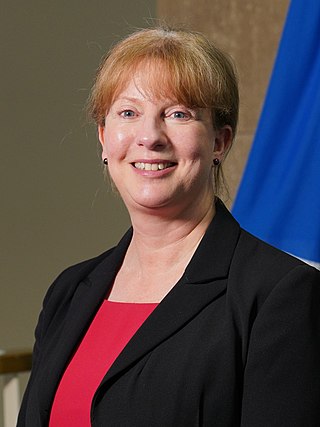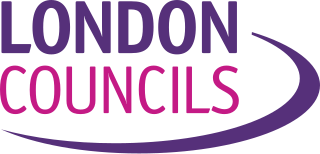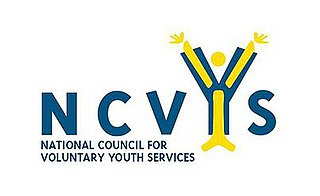
Local government in Scotland comprises thirty-two local authorities, commonly referred to as councils. Each council provides public services, including education, social care, waste management, libraries and planning. Councils receive the majority of their funding from the Scottish Government, but operate independently and are accountable to their local electorates. Councils raise additional income via the Council Tax, a locally variable domestic property tax, and Business rates, a non-domestic property tax.

The Department of Health and Social Care (DHSC) is a ministerial department of the Government of the United Kingdom. It is responsible for government policy on health and adult social care matters in England, along with a few elements of the same matters which are not otherwise devolved to the Scottish Government, Welsh Government or Northern Ireland Executive. It oversees the English National Health Service (NHS). The department is led by the Secretary of State for Health and Social Care with three ministers of state and three parliamentary under-secretaries of state.

Shona McRory Robison is a Scottish politician who has served as Cabinet Secretary for Finance and Local Government since 2023. A member of the Scottish National Party (SNP), she previously served as Deputy First Minister of Scotland from 2023 to 2024. Robison has been the Member of the Scottish Parliament (MSP) for Dundee City East since 2003 and was an additional member for the North East Scotland region from 1999 to 2003.
Care in the Community is a British policy of deinstitutionalisation, treating and caring for physically and mentally disabled people in their homes rather than in an institution. Institutional care was the target of widespread criticism during the 1960s and 1970s, but it was not until 1983 that the government of Margaret Thatcher adopted a new policy of care after the Audit Commission published a report called 'Making a Reality of Community Care' which outlined the advantages of domiciliary care.

Kent County Council is a county council that governs the non-metropolitan county of Kent in England. The non-metropolitan county is smaller than the ceremonial county, which additionally includes the unitary authority of Medway. Kent County Council is the upper tier of elected local government, below which are 12 district councils, and around 300 town and parish councils. The county council has 81 elected councillors. It is one of the largest local authorities in England in terms of population served and the largest local authority of its type. The council is based at County Hall in Maidstone. It has been under Conservative majority control since 1997.

London Councils is the collective of local government in Greater London, England. It is a cross-party organisation that represents London's 32 borough councils and the City of London. It was formed in 1995 as a merger of the London Boroughs Association and the Association of London Authorities. In April 2000 it gained further functions as strategic local government in London was reorganised. London Councils is a think tank and lobbying organisation, and also provides some services directly through legislation that allows multiple local authorities to pool responsibility and funding, such as Freedom Pass. London Councils is based at 59½ Southwark Street. It is due to move to 12 Arthur Street in the City of London in 2024.

The Local Government Association (LGA) is the national membership body for local authorities in England and Wales. Its core membership is made up of 317 English councils and the 22 Welsh councils through the Welsh Local Government Association.

NHS Scotland, sometimes styled NHSScotland, is the publicly–funded healthcare system in Scotland and one of the four systems that make up the National Health Service in the United Kingdom. It operates 14 territorial NHS boards across Scotland, supported by seven special non-geographic health boards, and Public Health Scotland.

The Council of European Municipalities and Regions (CEMR) is the largest organisation of local and regional governments in Europe. Its members are 60 national associations of towns, municipalities and regions from 41 countries that are part of the Council of Europe. Together these associations represent about 130,000 local and regional authorities.

The Deputy Minister for Enterprise and Lifelong Learning in Scotland was a cabinet position in the Scottish Government. The position was created in 1999, with the advent of devolution and the institution of the Scottish Parliament, taking over some of the roles and functions of the former Scottish Office that existed prior to 1999.
David Alexander is a former leader of Falkirk Council from February 2001 to May 2007 and led the SNP Group on the council for twenty years. He is one of two SNP councillors for Falkirk North Ward. He is a non-executive board member of the Scottish Ambulance Service.

Alison McClure McInnes is a Scottish Liberal Democrat politician. She was the Scottish Liberal Democrat spokesperson for Health and Justice in the Scottish Parliament. She was a Member of the Scottish Parliament (MSP) for the North East Scotland region 2007–2016, when she lost her seat at the 2016 Scottish Parliament election. Whilst in Parliament, McInnes was a member of the Justice Committee and a substitute member of Rural Affairs, Climate Change and Environment Committee of the Scottish Parliament.
Carers' rights are rights of unpaid carers or caregivers to public recognition and assistance in preventing and alleviating problems arising from caring for relatives or friends with disabilities. The carers' rights movement draws attention to issues of low income, social exclusion, damage to mental and physical health identified by research into unpaid caregiving. In social policy and campaigning the movement distinguishes such people's situation from that of paid careworkers, who in most developed countries have the benefit of legal employment protection and rights at work. With an increasingly ageing population in all developed societies, the role of carer has been increasingly recognized as an important one, both functionally and economically. Many organizations which provide support for persons with disabilities have developed various forms of support for carers/caregivers as well.
In England, social care is defined as the provision of social work, personal care, protection or social support services to children or adults in need or at risk, or adults with needs arising from illness, disability, old age or poverty. The main legal definitions flow from the National Health Service and Community Care Act 1990, with other provisions covering disability and responsibilities to informal carers. That provision may have one or more of the following aims: to protect people who use care services from abuse or neglect, to prevent deterioration of or promote physical or mental health, to promote independence and social inclusion, to improve opportunities and life chances, to strengthen families and to protect human rights in relation to people's social needs.

The National Council for Voluntary Youth Services (NCVYS) was a membership network of over 200 voluntary and community organisations, as well as local and regional networks, that work with and for young people across England. The organisation closed in 2016. For 80 years, NCVYS acted as an independent voice of the voluntary and community youth sector, working to inform and influence public policy, supporting members to improve the quality of their work, and also raising the profile of the voluntary and community sector's work with young people.
Health and Social Care Partnerships, (HSCPs) are organisations formed to integrate services provided by Health Boards and Councils in Scotland. Each partnership is jointly run by the NHS and local authority. There are 31 HSCPs across Scotland. These are statutory bodies, which took over responsibilities from Community Health Partnerships. They are responsible for £8.5 billion of funding for local services.

Armenia was admitted into the United Nations on 2 March 1992, following its independence from the Soviet Union. In December 1992, the UN opened its first office in Yerevan. Since then, Armenia has signed and ratified several international treaties. There are 20 specialized agencies, programs, and funds operating in the country under the supervision of the UN Resident Coordinator. Armenia strengthened its relations with the UN by cooperating with various UN agencies and bodies such as the International Monetary Fund, the World Bank, the World Food Programme, and with the financial institutions of the UN. Armenia is a candidate to preside as a non-permanent member of the UN Security Council in 2031.

Public Health Scotland (PHS) is the national public health body for Scotland. It is a Special NHS Health Board, and it is jointly accountable to the Convention of Scottish Local Authorities (COSLA) and the Scottish Government. Fully exercising its functions from 1 April 2020 as Scotland's leading national agency for improving and protecting the health and well-being of all of Scotland's people, it is jointly sponsored by COSLA and the Scottish Government, and collaborates with third sector organisations.

Kelly Marie Parry is a Scottish politician serving as the leader of the Midlothian Council since 2022. A member of the Scottish National Party (SNP), she has been a councillor, representing the Midlothian West ward since 2015.

Shona Morrison is a Scottish former nurse who is a politician in Moray. She has led the Moray Council and she is the President of the Convention of Scottish Local Authorities.















